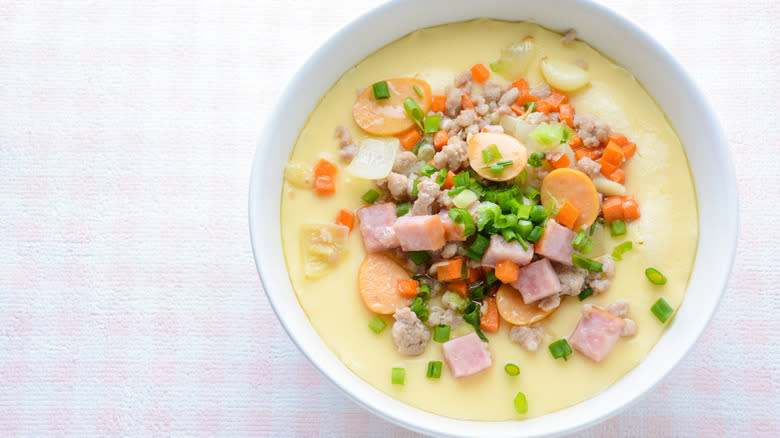The Absolute Best Water Ratio For Perfect Chinese Steamed Eggs

A culinary specialty residing outside the mainstream of Western-style cooking makes it all the more enticing. That's especially true when it bears a name like Chinese steamed eggs. Toss out any preconception that the dish involves steaming a typically hard-boiled egg, as this luscious delicacy is far different. Considering that its origin lies thousands of miles from American soil, it's okay if you've never tasted the rich creaminess of Chinese steamed eggs, and all the more understandable that its cooking method is a mystery.
Let's fix that here and now. First off, Chinese steamed eggs are similar to a soft, velvety custard -- one that's created primarily with eggs, water, and a special bit of know-how. Minor ingredient variations arise depending on the chef, but the most crucial part of creating this dish is almost universally the same whether in home kitchens or professional restaurants. It's the ever-important ratio of water to eggs. If you get that wrong, it can be a lumpy or mottled disaster –– or it becomes some other version of steamed eggs, such as the Korean incarnation.
The ratio is common knowledge in Chinese cooking, and it's extremely simple to remember: one part water to two parts eggs. That means a very small batch of Chinese steamed eggs, suitable for one person, would require 1 cup of water and two large eggs. But why stop at a single serving? Go for a standard-sized bowl of custardy goodness with 2 cups of water and four eggs.
Read more: Hacks That Will Make Boiling Your Eggs So Much Easier
The Essential Balance For Chinese Steamed Eggs

The 1:2 ratio is practically a golden rule when making Chinese steamed eggs, but some chefs grudgingly offer a caveat. If you're not a fan of super-soft texture in an egg-based treat, instead preferring a slightly firmer body, you can use a bit less water –– but only a slight reduction from 2 cups water down to 1.5 cups per four eggs. Otherwise, you annihilate the perfect balance.
Though water stakes its claim as the essential liquid component of Chinese steamed eggs, some chefs like using chicken broth instead, for extra flavor. Still, other recipes get that flavor punch using one or one-half teaspoon of chicken powder or bouillon. It's also possible to get a taste burst by dashing small amounts of soy sauce or a drop or two of sesame oil to the top of the completed dish.
It's worth mentioning that the water in that essential ratio must be warm to ensure a smooth, blemish-free surface that's silky and aesthetically pleasing. You can use a cooled boil, achieved by boiling the water to remove impurities, then letting it cool down to about 100 to 110 degrees Fahrenheit before mixing with the beaten eggs.
Preserving that delicate ratio of water to eggs before stovetop steaming is easily achieved by covering the bowl with hole-punched plastic wrap to prevent condensation. Then, after steaming that mixture to perfection, you have the option of tossing in salt or other ingredients like scallions, proteins, veggies, shrimp, grated cheese, or nuts.
Read the original article on Tasting Table.

